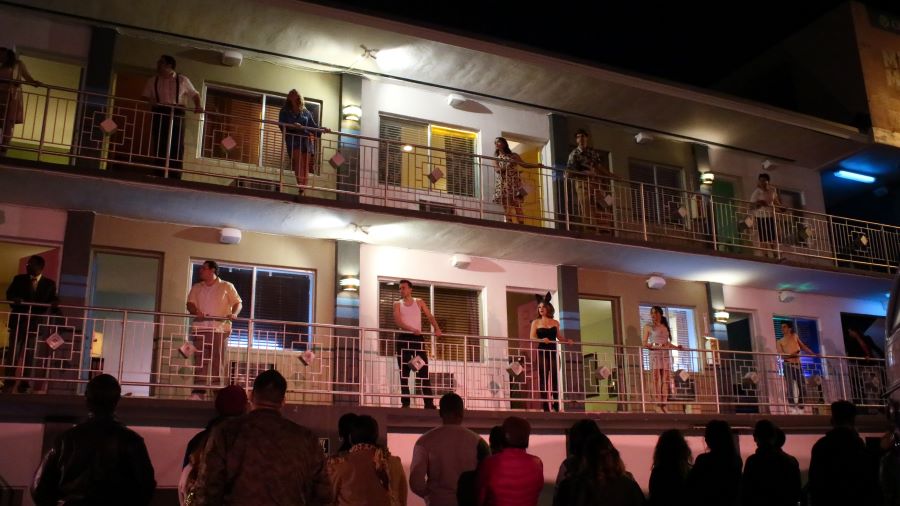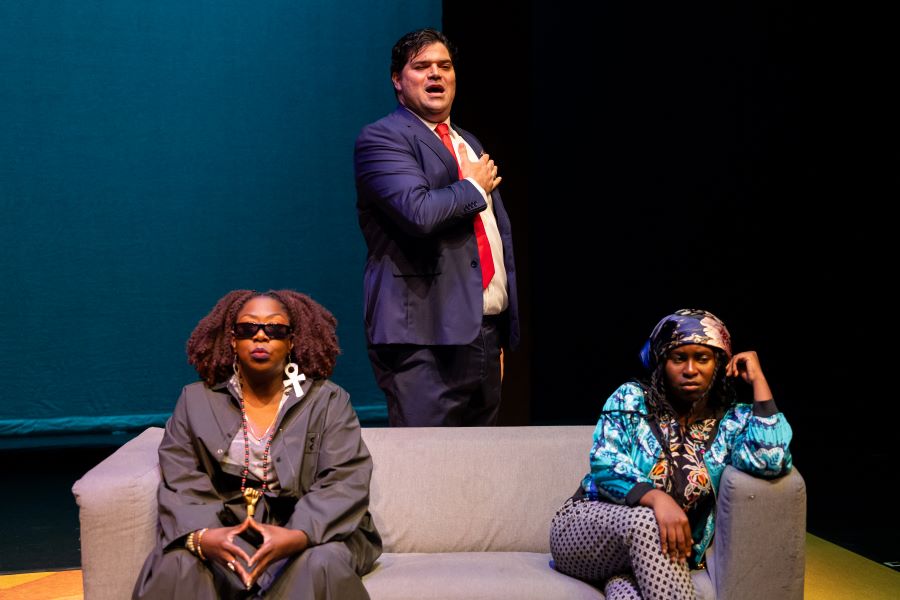In June, Florida Gov. Ron DeSantis vetoed $32 million allocated for arts and cultural grants. It is a significant financial blow to arts nonprofits across the state. Each year, organizations are required to submit annual applications for vetting to Florida’s Division of Arts & Culture (FDAC) and could qualify for up to $150,000 in grants. This year, the FDAC recommended about $77 million toward 864 grants, but lawmakers approved $32 million. That was the earthquake, but then the aftershock happened when DeSantis vetoed arts funding altogether.

Jennifer Jones, president and CEO of the Florida Cultural Alliance (FCA), provides a critical perspective on the situation. Established in 1985, the FCA is a key advocate for arts and culture funding in the state. The organization works to ensure that grants from the FDAC are sustained and effectively distributed. Jones notes that the $32 million cut has a broader economic impact than might initially be evident. Among the cultural entities affected by the veto are zoos, botanical gardens, community theatres, and professional opera companies. Each of these organizations plays a unique role in Florida’s cultural ecosystem. For instance, Pérez Art Museum Miami, the city’s premier art museum, lost $70,500 in funding. Further, many grants serve as matching funds, essential for securing additional financial support from other sources. Losing state funding can result in a multiplied financial shortfall, where a $1 reduction in state support can translate into a $2 or more loss when considering the leveraged impact on other funding sources.
Many fear this move is a reflection of broader political trends that threaten cultural expression in Florida. Yet the fight for the arts in Florida is far from over.

Already Tight
For organizations that were already struggling to recover from the Covid-19 pandemic, like City Theatre in Miami, the funding cut translates into operational challenges and potential reductions in programming. Said artistic director Margaret Ledford, “We’re dealing with a shortfall in our current fiscal year, which will likely force us to cut back on free programming and possibly let go of staff.” This sentiment is echoed across the sector, where organizations are bracing for the financial strain of diminished resources.

Miami New Drama, operating from the historic Colony Theatre on Miami Beach, faces its own set of challenges. Said artistic director Michel Hausmann, “We had already prepared for a 50 percent cut in funding, which was tough enough. But the veto, which meant losing an additional $75,000, really complicates things for us. This amount represents significant portions of our budget, including the salary of a staff member or a third of our education budget.”
While the veto did not directly affect Juggerknot Theatre Company, known for its immersive productions that celebrate Miami’s diverse neighborhoods, the loss represents a significant challenge for the tiny but mighty theatre company, which had applied for a 2025-26 grant in the next cycle. Due to the current situation, Tanya Bravo, Juggerknot Theatre Company’s founder and executive director, described the moment as one of uncertainty.
“I don’t know if I’m going to get that funding,” Bravo said, “and I need to prepare myself to find that funding somewhere else.”
Planning ahead has always been complicated for nonprofit theatres, because the business model makes future viability dependent on a lot of undependable circumstances. This problem has been even more pronounced in the last few years, with increases in production costs and decreases in revenue from ticket sales and subscriptions. This isn’t just a Florida issue, it’s a national one. According to the U.S. Bureau of Labor Statistics, from June 2023 to June 2024, wages and salaries in the private sector rose by 4.6 percent, while benefit costs increased by 3.5 percent. Coupled with an overall inflation rate of 3 percent, which affects the cost of everything from lumber to lights, these rising costs create an extra strain on already lean theatre budgets. This economic pressure forces theatres to make tough decisions, often at the expense of programming and community outreach.
“Florida is a guinea pig politically on what could happen nationally. We have to pay attention to this and spread the word, because it does feel like we are being silenced in a way.”
What’s more, every dollar spent on the arts generates approximately nine dollars in local economic activity. Reducing arts funding impacts not only the theatres but also local businesses that benefit from the influx of patrons, such as restaurants and hotels, which in turn affects jobs at supporting small businesses. Miami Beach, for example, benefits from the presence of world-class cultural institutions, which make the city a more attractive place to live and work. By cutting funding for the arts, the state risks undermining its appeal to potential residents and businesses.
“This isn’t just about the intrinsic value of the arts; it’s about economic growth and quality of life,” Hausmann said.
Indeed, according to a study from Americans for the Arts, in collaboration with the state FDAC and Citizens for Florida Arts Inc., the state’s arts and cultural industry generates $5.7 billion in economic activity a year, including $2.9 billion by nonprofit arts and culture organizations, and supports more than 91,000 full-time jobs.

Political Motivations
The veto comes against a backdrop of broader political trends in Florida, including anti-LGBTQ+ legislation. DeSantis publicly justified the veto in a press conference by singling out the four annual fringe festivals that take place in Fort Myers, Tampa, Sarasota, and Orlando, as promoting “sexual” content that was an “inappropriate use of taxpayer dollars.” It’s worth noting that while these fringe festivals do include some adult content, it is always accompanied by warnings and age restrictions. Some observers interpret the funding cut as part of a larger pattern of political extremism.
“Florida is a guinea pig politically on what could happen nationally,” Bravo said. “We have to pay attention to this and spread the word, because it does feel like we are being silenced in a way.”
In an open letter to DeSantis, leaders from Orlando and Tampa Fringe are asking him to reconsider his veto, further stating they would rather not be included in this year’s budget if that means that funding can be reinstated to other organizations.
To further understand the political climate around the cuts, American Theatre emailed dozens of members of the Florida State House, the Governor’s office, and the Lt. Governor’s office for more information. We received only one reply, from State Representative Vicki Lopez, who said, “While the legislature has indeed shown its support for the arts, a governor’s veto can only be reversed through a veto override. We have made our concerns known to the leadership, but they are the only ones who can call a special session to override vetoes, and they have not signaled a willingness to do so.” Rep. Lopez explained how, as a member of the subcommittees for Pre-K-12 and Infrastructure & Tourism Appropriations, she understands the significant impact that arts and culture have on both education and the economy. “The arts are not just a cultural enrichment but a fundamental pillar for the educational and economic vitality of our communities.”

Social Consequences
Artists are custodians of local heritage, offering both a reflection of and a contribution to a community’s identity. These funding cuts threaten not just the survival of arts organizations, but also the lives of individual artists who already experience financial instability. This instability is exacerbated by the high cost of living in places like Miami, which further strains emerging artists already struggling to make ends meet.

Andie Arthur, executive director of the South Florida Theatre League, highlighted a growing trend of talent drain. “Theatres are accustomed to overcoming adversity, but can we really create sustainable careers in such an unstable environment?” Arthur asks. “We’re seeing a lot of local talent feeling they need to relocate to other states where the environment is more supportive of their careers.”
Beyond the economic impact, City Theatre’s Ledford underscored the emotional and social consequences of these funding cuts.
“The arts are a crucial part of our community’s emotional health,” she said. She mentioned that arts experiences foster empathy and community connection, values that are increasingly vital in today’s polarized environment. The decision to cut funding, she argued, aligns with broader political trends that marginalize and undermine cultural institutions, especially those that challenge prevailing norms.

The Path Forward
Despite the setbacks, there is a palpable sense of resilience among Florida’s cultural leaders. Jones said she was hopeful that this crisis will galvanize community support and advocacy, creating a catalyst for new forms of collaboration and advocacy.
The FCA is not only engaging in grassroots advocacy but also exploring “grass-tops” strategies. These involve leveraging the influence of donors and community leaders who have a stake in the arts and can advocate for renewed support at higher levels of government. The goal is to foster a dialogue that reinforces the value of arts funding and its critical role in enhancing quality of life.
In short, Florida arts leaders are mobilizing to address the funding cuts. “We’re calling on people to speak out, write letters, and advocate for the importance of arts funding,” said Ledford. Ledford encourages both artists and audiences to engage with their legislators and community leaders to emphasize the vital role of the arts in society.
Perhaps DeSantis’s veto will prompt a reevaluation of how arts funding is approached. Jones said she envisions a future where arts funding is recognized not just as a discretionary expenditure but as an essential investment in community health and vibrancy. She advocates for a model where funding is not only stable, but also responsive to the diverse needs of Florida’s cultural landscape.
In the face of adversity, artists have always shown an incredible capacity for renewal and innovation. Through collective action, solidarity, and a renewed commitment to their mission, leaders at Florida’s cultural organizations will continue to fight for their place in the community. As Bravo aptly put it, “We have to continue to tell stories, and our stories are about the people in Miami—they should not be silenced.”
Cristina Pla-Guzman (she/her) is a nationally recognized, award-winning teaching artist, director, performer, and writer based in Miami.


